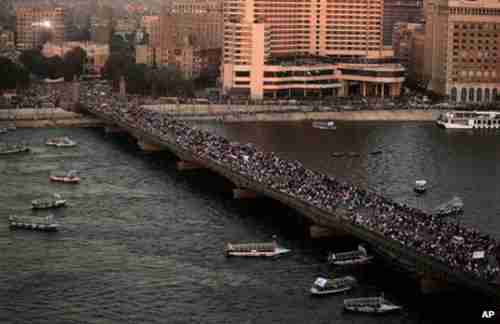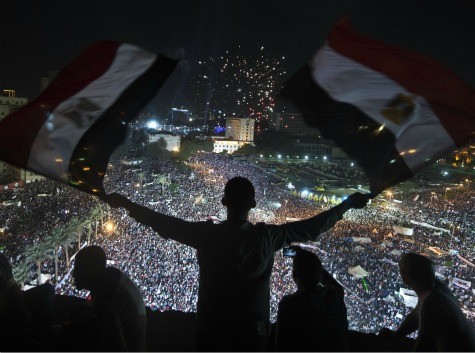
This morning’s key headlines from GenerationalDynamics.com
- Morsi facing treason charge as millions demonstrate in Egypt
- Ousting Morsi may have saved Egypt from austerity, for a while
- Eastern Mediterranean becomes the next Persian Gulf
Morsi facing treason charge as millions demonstrate in Egypt

Anti-Morsi demonstrators cross a bridge in Cairo on Friday (BBC)
Hundreds of thousands of pro-Army demonstrators filled Tahrir Squarein Cairo, Egypt, on Friday, in opposition to ousted president MohamedMorsi, responding to Wednesday’s request by Army chief Abdel-FattahEl-Sisi to give the Army a “mandate” to fight “terrorism andviolence,” presumably referring to the Muslim Brotherhood.Pro-Morsi demonstrators filled other locations in Cairo andother cities. The protests were mostly peaceful, but pro-Morsiactivists reported that some of their demonstrators had comeunder attack by security forces, injuring 35 people.
The great drama of the day occurred when the government handed down anaccusation that Morsi had conspired with Gaza militants Hamas to stormpolice stations and jails and to break a number of Muslim Brotherhoodleaders, including Morsi himself, out of jail in January 2011 at thestart of the revolution. Morsi has not been seen in public since hewas ousted on July 3, and Friday’s charges mean that he will continueto be held at an undisclosed location for at least another 15 days. Also a charge of conspiring with a foreign government (Hamas) againstEgypt’s government could turn into a charge of treason. Both Hamasand the Muslim Brotherhood called the conspiracy charges “ridiculous,”although the jail break did occur. BBC andAl-Jazeera and Al-Ahram (Cairo)
Ousting Morsi may have saved Egypt from austerity, for a while
Since Hosni Mubarak was ousted by the Egyptian Revolution that beganin January, 2011, Egypt’s foreign reserves have fallen from $36billion to $14.9 billion. During the last year when Mohamed Morsiwas president, Egypt’s economy continued to deteriorate. SinceJanuary, the budget deficit has been running at about $3.2 billion permonth, almost half in government spending. Morsi had been desperatelytrying to negotiate a loan from the International Monetary Fund (IMF),but that would have meant harsh austerity measures, including bigcutbacks in government spending.
However, the economy has stabilized in recent weeks since the coupthat ousted Morsi. With Morsi’s MuslimBrotherhood out of power, Egypt has been promised $12 billion inaid from Gulf Arab states that don’t like or trust the MuslimBrotherhood–Saudi Arabia, United Arab Emirates (UAE), and Kuwait.Qatar, the home of al-Jazeera and the lover of the Muslim Brotherhood,had given $7 billion to Egypt in the last year but that hadn’t beenenough to keep Egypt’s economy from deteriorating.
But now with this $12 billion flowing in, Egypt’s new leaders don’thave to worry about those nasty austerity measures that have been such aproblem in Greece and other European countries that received IMF aid.Egypt can go on spending as before. According to Ahmad Galal, Egypt’snew finance minister:
One of the important tools to deal with the budgetdeficit is stimulating the economy. Stimulating the economy meanstax revenues will increase and, in turn, the deficit willdecrease.
Political agreement is the best and shortest route to revive theeconomy because, if there is stability and security and agreement,tourists will come back and local and foreign investors will bemore keen on investing. We will seek to pump more new funds intothe economy and not follow austerity measures. We do not want toincrease taxes sharply, that is if we increase them at all, and wedo not want to lower spending in a way that will slow a revival ofthe economy.
So it looks like Egypt is going to follow the same government spendingpolicies as the U.S., Ireland, Greece, and other countriesduring the credit and real estate bubble of the mid-2000s decade. Egypt doesn’t need funding from a big bubble, because they’vegot the Arab nations to fund the growth. It ought to be interesting.al-Ahram (Cairo) and Reuters
Eastern Mediterranean becomes the next Persian Gulf
For more than two decades, the United States has placed the issue ofEastern Mediterranean maritime security on the backburner. But the2010 discovery of vast oil and gas deposits in the region’s LevantBasin is eliciting competition over exclusive economic zones amongcountries such as Israel, Cyprus, Turkey, and Lebanon. Furthermore,the naval activities of Iranian-backed terrorist groups, Russia’squest to expand its international influence, Turkey’s overconfidentposture, and political unrest in Syria and Egypt have collectivelyexacerbated tensions in the Eastern Mediterranean. As conflicts loom,U.S. armed forces should be prepared to face the same kinds oftensions as in the Persian Gulf. American Enterprise Institute
KEYS: Generational Dynamics, Egypt, Mohamed Morsi, Muslim Brotherhood,Hamas, Hosni Mubarak, International Monetary Fund,Saudi Arabia, UAE, Kuwait, Qatar, Turkey, Russia
Permanent web link to this article
Receive daily World View columns by e-mail

COMMENTS
Please let us know if you're having issues with commenting.